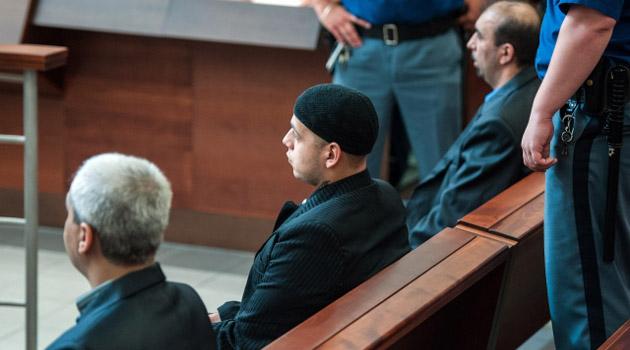Czech Constitutional Court rejects complaint from perpetrator of machete attack serving 17.5 years in prison

The Czech Constitutional Court (Ústavní soud – ÚS) has rejected a complaint from Vojtěch Husák, one of the perpetrators of a machete attack on the personnel of a bar in the town of Nový Bor several years ago who received the longest sentence. He is currently serving 17.5 years in prison.
This is the third and apparently the final decision by the ÚS in this matter, according to the Czech News Agency, which has ascertained this by doing a search of the court’s database. The ÚS previously rejected a complaint filed by Husák’s parents, as well as one filed by another convicted perpetrator, Antonín Sinu, who got 15 years in prison.
In his complaint, Husák questioned the claim in the indictment that the assailants perpetrated their crime on the basis of a prior agreement. He alleged that the court’s impression of what preceded the events was not based on any evidence.
He also asserts that he never intended to kill anyone. His complaint claims the justice system should have qualified his behavior at the most as attempted grievous bodily harm.
Husák believes that the punishment handed down to him is disproportionate. The Constitutional Court justices, however, upheld the previous verdict in its entirety.
"From the justification of the verdict of the first-instance court and the decisions of the higher courts, it can be seen from the reasonably detailed description and interpretation of the plaintiff’s conduct that his guilt was proven on the basis of both direct and indirect evidence that was sufficiently described in detail and taken into consideration," the finding reads. During the incident, which took place in August 2011, the attackers injured three men in the bar.
The attack also sparked several anti-Romani demonstrations in northern Bohemia. The High Court in Prague sentenced the perpetrators to anywhere from five years to 17.5 years in prison.
The case of a fifth assailant is being reviewed separately. Husák, the alleged leader of the small group, was punished most severely.
In their appeals to the Czech Supreme Court (Nejvyššímu soudu – NS), the four perpetrators complained that the punishments handed down against them were allegedly meant to make examples of them. They also asserted that the eventual legal qualification of their behavior was influenced by demands that were publicized in the media.
According to the NS, however, the attack on the customers of the bar actually was attempted murder in which the assailants were reacting to a preceding, smaller-scale conflict. They ran into the bar armed with batons, blade weapons, and sticks.
They immediately began attacking people in the bar and frequently aimed their blows at people’s heads and vital organs, the NS reminded them in its finding. None of the assailants subsequently showed any interest in the fate of the injured.
The attackers were taking revenge for a preceding conflict between a barmaid and two Romani youths who had gone to the bar to play the slot machines. After they won several hundred crowns and wanted to claim their winnings, the barmaid asked them to show identification and the youths began to vulgarly insult her.
Other customers stood up for the barmaid and escorted the pair out of the bar, during which one customer allegedly struck one of the boys. The Romani men allegedly returned to the bar shortly thereafter with reinforcements and assaulted the customers without prior warning using blows, kicks, a machete and sticks.
One of the injured men had to have part of his skull replaced with a metal plate. Another escaped with a concussion and contusions.